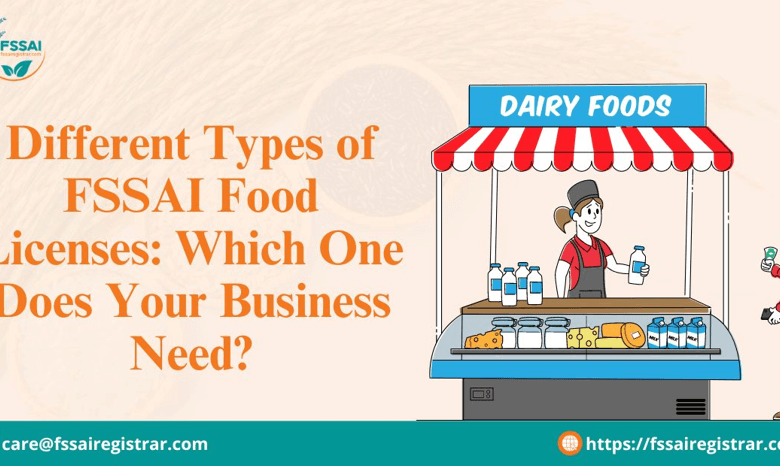Different Types of FSSAI Food Licenses: Which One Does Your Business Need?

Starting a food business in India involves navigating various regulatory requirements, one of the most crucial being the FSSAI food license. The Food Safety and Standards Authority of India (FSSAI) mandates that all food-related businesses obtain a license to ensure food safety and quality. Depending on the scale and nature of your business, you might need one of several types of FSSAI license. Here’s a comprehensive guide to help you determine which FSSAI license your business needs.
1. Basic FSSAI Registration
Who Needs It?
- Small food businesses
- Petty food manufacturers and distributors
- Small retailers, itinerant vendors, hawkers
- Cottage industries related to food products
Eligibility Criteria:
- Annual turnover less than ₹12 lakhs.
Examples:
- Small home-based food businesses
- Local grocery stores
- Small canteens
Validity:
- 1 to 5 years, renewable.
2. State FSSAI License
Who Needs It?
- Medium-sized food businesses
- Businesses operating within a single state
Eligibility Criteria:
- Annual turnover between ₹12 lakhs and ₹20 crores.
Examples:
- Mid-sized food manufacturers
- Storage units, transporters, retailers, marketers
- Small to medium-sized restaurants and cafes
Validity:
- 1 to 5 years, renewable.
3. Central FSSAI License
Who Needs It?
- Large food businesses
- Businesses operating in multiple states
Eligibility Criteria:
- Annual turnover above ₹20 crores.
- Importers and exporters of food products.
- Food business operators supply food to government offices and departments.
- Businesses involved in large-scale food manufacturing, processing, storage, or distribution.
Examples:
- Large manufacturers and processors like dairy units, meat processing units
- Large restaurants and food chains
- Importers of food products
Validity:
- 1 to 5 years, renewable.
Key Differences and Requirements
Basic Registration:
- Documentation: Identity proof, passport-sized photo.
- Fees: Nominal registration fee.
- Process: Simple, online application.
State License:
- Documentation: Detailed business information, proof of address, list of food categories, and manufacturing unit layout.
- Fees: Vary based on business type and size.
- Process: Online application followed by inspection.
Central License:
- Documentation: Comprehensive business details, annual turnover proof, import/export code (if applicable), food safety management plan.
- Fees: Higher than state license, depending on business nature.
- Process: Online application, stringent scrutiny, and possible multiple inspections.
How to Apply for an FSSAI License
- Determine the Type: Identify the license type based on your business scale and turnover.
- Gather Documentation: Collect all necessary documents for your specific license type.
- Online Application: Apply through the FSSAI’s online portal (https://fssairegistrar.com).
- Fill out the application form.
- Fee Payment: Pay the required fee online.
- Approval: Once approved, download the license certificate from the portal.
Read also: Future Trends: How the Government e-Marketplace is Evolving
Benefits of Obtaining the Correct FSSAI License
Obtaining the appropriate FSSAI license for your business comes with numerous benefits:
- Legal Compliance: Ensures your business operates legally under Indian food safety laws, avoiding potential legal issues and fines.
- Consumer Trust: Builds credibility and trust among consumers, assuring them of the safety and quality of your food products.
- Market Expansion: Facilitates easier market entry and expansion, especially for businesses looking to supply to large retailers or export internationally.
- Quality Control: Encourages adherence to high standards of hygiene and safety, reducing the risk of foodborne illnesses and recalls.
- Brand Reputation: Enhances your brand’s reputation as a reliable and compliant food business, leading to better customer loyalty and market positioning.
Common Mistakes to Avoid During FSSAI Registration
When applying for an FSSAI license, avoid these common mistakes to ensure a smooth process:
- Incorrect License Type: Misidentifying the appropriate license type based on your business turnover and scale can lead to application rejection.
- Incomplete Documentation: Failing to submit all required documents or providing inaccurate information can delay the approval process.
- Ignoring Renewal Dates: Not renewing your license on time can result in penalties and disrupt business operations.
- Non-Compliance with Standards: Ignoring FSSAI regulations and standards post-licensing can lead to license suspension or cancellation.
Tips for Maintaining FSSAI Compliance
- Regular Audits: Conduct regular internal audits to ensure continuous compliance with FSSAI standards.
- Employee Training: Train your staff on food safety practices and regulations to maintain high hygiene standards.
- Stay Updated: Keep abreast of any updates or changes in FSSAI regulations and incorporate them into your operations.
- Record Keeping: Maintain meticulous records of all food safety management practices, inspections, and audits.
Note: Apply for fssai license renewal through fssai portal.
Conclusion
Securing the correct FSSAI license is essential for the legal operation and credibility of your food business. Understanding which license suits your business type will streamline the application process and ensure compliance with food safety standards. Whether you run a small home-based venture or a large food processing unit, adhering to FSSAI regulations safeguards your business and enhances consumer trust. Navigating the FSSAI licensing process is a critical step for any food business in India. Understanding the different types of licenses, their eligibility criteria, and the application process can significantly simplify this task. By obtaining the correct FSSAI license, you not only ensure legal compliance but also build a foundation of trust and quality that can propel your business to greater heights.






